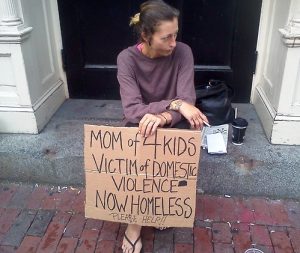
Image courtesy of the National Coalition for the Homeless
In the U.S., there is a profound stigma around being homeless and negative stereotypes about people experiencing homelessness are commonplace, painting them as lazy, addicted, mentally ill and potentially dangerous. Such stigma and stereotypes frequently distract us from serious challenges faced by people who experience homelessness, such as gender-based violence.
Approximately 50% of all women who experience homelessness report that intimate partner violence (IPV) led to their homelessness. Some find themselves in desperate need of a temporary safe place after fleeing violence at home, while others seek shelter because they lack economic security after leaving an abusive relationship. For mothers, the statistics are even more troubling: more than 80% of homeless mothers with children previously experienced domestic violence. Moreover, once homeless, many of survivors of IPV continue to experience violence and trauma at high rates.
A 2016 survey of 32 big cities found that Washington D.C. had the highest rate of homelessness. While those numbers dropped the following year, currently, nearly 900 unaccompanied women experience homelessness on any given night in D.C. According to a 2017 study, violence is the primary driver of homelessness for nearly one-third of these women. Survivors of violence or abuse in D.C., moreover, are more likely to experience further violence during homelessness.
Both housing and violence are key determinants of women’s health. Half of women who experience IPV suffer physical injuries, with more than one out of four of these women requiring medical attention. In the long term, IPV against women is associated with increased incidence of depression, PTSD, chronic pain, and gastrointestinal and gynecological problems. Moreover, homeless women are already at high risk for mental illness, injury, substance use, and sexually transmitted infections.
The co-occurrence of homelessness and IPV among women can be difficult for shelter providers to tackle. Here in D.C., the Women’s Task Force of the Interagency Council on Homelessness (ICH) has called for services made available to women experiencing homelessness to be truly comprehensive, responding to the specific needs of women who have experienced IPV before and/or during housing placement.
Shelters like Calvary Women’s Services and House of Ruth are seeking to do just that, offering programs for women experiencing homelessness aimed specifically at healing and rebuilding from IPV. These programs include health and wellness services, personalized case management, and free on-site psychotherapy, in addition to transitional and permanent housing. Mothers also have the option of enrolling their children in therapeutic developmental daycare.
Unfortunately, the federal government is undermining homeless shelters’ efforts to ensure that their services are truly comprehensive and responsive to the needs of IPV survivors. The proposed federal Fiscal Year 2019 budget diverts funding away from critical programs and services that survivors rely on, decreasing funding available to shelters and other direct service providers by up to almost 26%.



